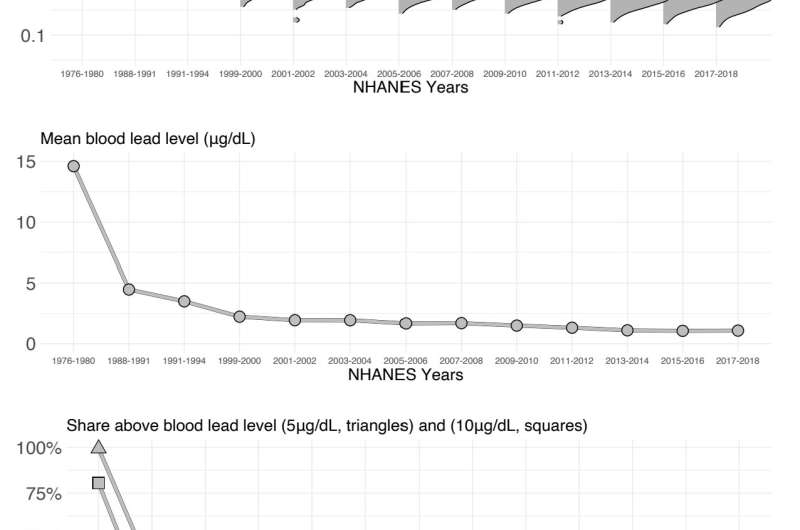This article has been reviewed according to Science X's editorial process and policies. Editors have highlighted the following attributes while ensuring the content's credibility:
fact-checked
trusted source
proofread
Lead exposure harms fertility, boosts infant mortality, and hurts infant birth outcomes

Lead has a range of adverse effects on fertility, infants, children, and adults. In a new article, researchers review research on the effect of lead on fertility, infant mortality, and infant birth outcomes. They conclude that lead exposure has several adverse effects and highlight the implications of these findings for policy.
The article, by researchers at Carnegie Mellon University (CMU) and Indiana University (IU), is published in the Review of Environmental and Economic Policy.
"Removing lead in gasoline has generated enormous public health benefits, but lead exposure remains significant, primarily because of industrial emissions," says Karen Clay, professor of economics and public policy at CMU's Heinz College, who coauthored the article. "A recent UNICEF report found that one in three children worldwide have blood lead levels above a critical threshold."
Much research links blood lead levels to short-term academic and behavioral outcomes, and in some cases, to longer-run outcomes, including high-school completion, crime, and labor market performance. Given that lead causes decreases in fertility and increases in mortality, the social costs are likely very large. Research on lead and infant health is also sparser but studies have shown that lead exposure in utero or later can harm infants' neurological development, other dimensions of health, or both.
The studies reviewed provide evidence that lead exposure harms fertility, increases infant mortality, and in some cases adversely affects infant birth outcomes. The findings highlight the importance of reducing lead exposure in water supplies and other sources to protect the health of vulnerable populations.
The findings also suggest the need for policymakers to carefully consider the potential displacement effects of environmental regulations: Stricter regulations in one region may lead to increased lead exposure in other regions due to shifts in industrial activities.
"A comprehensive and well-coordinated approach to reducing lead exposure is necessary to protect public health and improve infant health outcomes," says Edson Severnini, associate professor of economics and public policy at CMU's Heinz College, who coauthored the article. The authors identify three areas for policymakers to consider:
- More information is needed about exposure in utero. Among options: requiring lead testing when maternal blood testing is done; collecting baby teeth, which show lead levels; intervening to reduce the exposure of children with high levels of teeth lead and improve their outcomes; and supplementing the diet of pregnant women with calcium, which reduces blood lead levels.
- Researchers should conduct more quasi-experimental studies on the effects of lead on fertility and infant mortality, as well as the presence of lead in the air.
- Policymakers should not wait for more studies before routinely screening pregnant women for blood lead levels.
The authors also suggest that blood lead level data should be used if they are available, but note that in many settings, such data are not routinely collected. Even in cases where blood lead levels are available, the data have some limitations, including that they are not representative of the broader population.
"If blood lead level data are going to be required for policy purposes, much larger investments in measurement need to be made," says Alex Hollingsworth, associate professor of environmental affairs at IU's Paul H. O'Neill School, who coauthored the study. "Even in the absence of data on blood lead levels, quasi-experimental studies provide policy-relevant evidence on lead exposure outcomes."
More information: "The Impact of Lead Exposure on Fertility, Infant Mortality, and Infant Birth Outcomes," Review of Environmental and Economic Policy (2023), docs.iza.org/dp16236.pdf


















